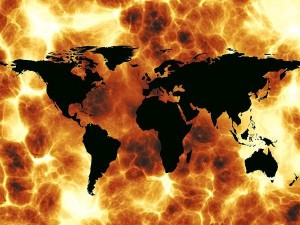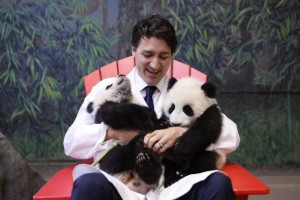The history of capitalism and democracy shows that we need to choose one or the other. The problem is that capitalism concentrates power in the hands of a few people who aren’t chosen through democratic means. Capitalism requires those people to pursue unlimited profit, because those who don’t lose their power to those who do.
When they have that power, they then buy government, because government is both the main threat to them, and the force which by which, through use of law and means like central banks bailing them out, they can keep themselves obscenely rich — even when markets would otherwise cause them to lose their money and thus their power.
The history from the Great Depression onwards is instructive. Capitalism caused a huge, nearly worldwide, depression. Government did not bail them out, and so they lost their power. FDR came to power, and more or less following Keynes’s prescriptions, he bailed them out. He and the people working with him put in place multiple protections to make sure that capitalism couldn’t cause such a crisis again.
Capitalists hated him for it. He had rescued them, but with the cost of 90 percent top marginal tax rates, huge estate taxes, regulation and aggressive anti-trust laws. Upon his death (little could be done while he was alive, as he was so popular), they immediately started attacking all the protections he had put in place. It took them decades, but they stuck to it, and after all, even in their reduced state, they were still powerful and could afford to pay people to spend their lives working against the New Deal.
The foremost intellectual servant of these men was Milton Friedman, but many, many labored in this cause. They built a political, economic, and intellectual infrastructure and waited for their opportunity. With the oil crises, inflation, and unemployment of the 70s, they had their chance. They made sure that an egalitarian model for dealing with the crisis wouldn’t work, and they got Thatcher and Reagan elected. Then, they dismantled the New Deal and all the protections against another economic catastrophe like the Great Depression.
This allowed them to vastly consolidate wealth, pushing power into the hands of fewer and fewer people. Antitrust law was gutted, unions cut to ribbons, and regulations which protected against them were destroyed, while new ones were put in place to ensure the concentration of wealth and power.
A small example of this was given to me by an accountant, who in the 70s used to do the taxes for Indian bands. When Reagan took over, the regulations were changed so that only large companies were allowed in the business and he was frozen out. This sort of thing happened everywhere, and, indeed, continues to this day.
But, alas, the capitalists weren’t stupid, and they knew that market concentration and removal of protections against bubbles meant that one day there might be another great crisis.
So they bought up economics lock, stock and barrel and paid economists like Bernanke to figure out how to make sure they’d never lose their wealth (and thus power) in a great market collapse again. Bernanke’s academic ouvre was described to me by Stirling Newberry, back around 2005, as “how to make sure another 1929 doesn’t lead to another FDR.”
They got him into the Federal Reserve, and people like him into other central banks, and when the Financial crisis of 2007/8 happened, the Fed bailed out the rich. Without the Federal Reserve, most of them would have lost everything, but the Fed alone effectively printed and gave them 20 trillion dollars, accepted their worthless securities at near face value for loans, and so on.
Meanwhile, largely under Obama, the crimes they had committed (and there was fraud all the way down, I doubt a single senior executive on Wall Street hadn’t engaged in red-letter fraud), were forgiven in exchange for fines that were less than the amount of money they had individual earned.
Power and money consolidated even further, and the “another-FDR moment” was avoided.
Since then, they have seized further and further control and increased their wealth and power even more. Citizen’s United, which allowed unlimited money into elections was probably the red line moment, but really, once the full-faith and money-printing ability of government was behind the rich, ensuring they could never lose power as a class, it was over.
The important thing to understand is that this structural. If capitalism is hegemonic (that is, dictates how most economic decisions are made and how power is parceled out), then this pattern repeats. FDR made the best effort in the history of capitalism to stop it form happening again, and he failed, buying only a few decades of relative egalitarianism and control of democratically-elected government over business rather than business over government.
There can be no peace between democracy and capitalism. They are in direct opposition to each other. Democracy requires egalitarianism to work, and capitalism requires money and power to be concentrated in a few hands.
We can have democracy, or we can have capitalism and we need to stop pretending that democracy can control capitalism sufficiently to stop it from doing vast damage. Indeed, the terrible timing of having capitalists take over democracy in the core industrial nations just as action on climate change and ecological collapse became necessary will cause billions of lives, and wipe out about half of all known species on Earth.
Because democracy also failed, democracy is now on the firing line. As things get worse (and they will get MUCH worse), every political arrangement and ideology which failed to deal with climate and ecology will be discredited.
Either democracy blames capitalism and kills capitalism, finding a new way to organize the economy, or democracy is likely to die with capitalism. And it will deserve to do so.

 One of the problems with how we are educated and how we work is that almost all of it is “grading on a curve.” What matters is what our teacher thinks of us; what our boss thinks of us. Except when it comes to sickness, nothing else matters even nearly as much.
One of the problems with how we are educated and how we work is that almost all of it is “grading on a curve.” What matters is what our teacher thinks of us; what our boss thinks of us. Except when it comes to sickness, nothing else matters even nearly as much. One of those amusing scientific studies runs as follows: Someone in a supermarket knocks over a large display of canned goods. They either:
One of those amusing scientific studies runs as follows: Someone in a supermarket knocks over a large display of canned goods. They either: